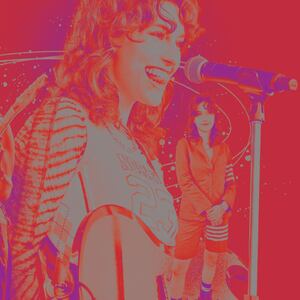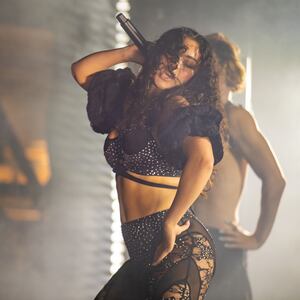Four years after Hayley Kiyoko dropped her ambitious debut album, Expectations, the singer-songwriter has returned with a fresh batch of pop earworms, this time armed with renewed clarity and hard-won perspective.
Her second album, Panorama, which dropped Friday, is basically the artistic embodiment of the well-worn cliché, “It’s about the journey, not the destination.” The album’s 13 tracks cover plenty of the lows Kiyoko weathered over the past couple of years, including battles with depression and feelings of isolation during the pandemic. Ultimately, however, she arrives at a place of balance, determined to remain present and enjoy the view on whatever calamitous path she’s traversing. As she puts it on the sonically lush, lyrically intimate title track, “I don’t have to be on the top to see.”
And because this is Hayley Kiyoko we’re talking about, she also has plenty of certified bops and cheeky kiss-offs on deck, including flirty album opener “Sugar at the Bottom” and lead single “For the Girls,” which arrived alongside a video parodying The Bachelorette and featuring real-life Bachelor alum Becca Tilley, Kiyoko’s girlfriend of the past four years.
ADVERTISEMENT
“For the Girls” continues the 31-year-old’s impressive track record of directing all her own music videos, which she’s done ever since her breakthrough moment in 2015 with “Girls Like Girls.” That video, which depicted a queer teen love story, cemented her as a trailblazer in the pop space and helped earn her the now-famous nickname “Lesbian Jesus.” It’s also the impetus for her next big dream: to turn “Girls Like Girls” into a feature-length film.
It’s a lofty goal, but she’s used to that kind of thing—as she tells The Daily Beast, “I’ve been doing music since I was 13, and I have always pursued being hopefully a pop star. And it’s a slow climb, but it’s a climb worth doing.”
Below, Kiyoko tells The Daily Beast about writing through depression, simplifying her sound, watching The Bachelorette, sharing a release date with Beyoncé, and more.
When did you start working on this album, and what kind of headspace were you in at the time?
I started at the top of 2020, and I wasn’t in a great headspace. I was pretty depressed at the time. I wrote a big chunk of the album, like “Deep in the Woods,” “Underground,” and “Luna,” during that time, and did most of it with Pat Morrissey and Kill Dave. And then I was like, “It’s still missing something,” so I met up with Danja on FaceTime and brought him in as an executive producer, and then all of 2021 was recutting, reproducing, reworking. Some new songs came about, like “For the Girls,” “Well,” and then “Panorama” was the last piece of the puzzle.
It's interesting that the songs you added toward the end are the upbeat ones and the happier ones. Is it safe to say that your headspace changed in that time?
That I’m doing “Well?” Yeah, I would say so. I definitely wanted to have some songs that embodied fun. “Sugar At the Bottom” is a really fun and flirty, cheeky song. So is “For the Girls.” And I wrote “Well” after going to a wedding and bumping into my ex, and I just liked the really poppy feel.
And then “Panorama” obviously inspired the title of the album. I definitely cried multiple times recording that song… realizing as I had gone through some dark valleys, that there was a view at every point and I just hadn’t taken time to really enjoy it. I wanted to write a song that was a reminder for me if I was in a head fog, to be like, “Hey, let’s be present. Have you seen the view? Look at all these things that you’ve overcome. Your resilience is infinite. You’ve got to keep going.”
What helped you get to that place? What was the shift that happened from 2020 to 2021 while you were working on this?
I don’t think it was just a year shift. I would say it was a life shift of looking back and recognizing that those moments that were really hard or dark or challenging, I had overcome so much to even get to that point. And I think also, navigating the pandemic forced me to be like... there was so much more to appreciate, and I need to enjoy life more, even if I don’t know the next step. I want to be able to stay as present as possible.
You mentioned Danja, and I was really excited to see his name in the credits, because he’s had a hand in so many amazing pop songs of the past several years. Was there any of his past work that you specifically referenced in these songs?
No, but I knew from his previous work that he knew how to really have the drums be so beefy, and have the bass and the snare really hit, and also make sure that the vocals were soaring. I think one amazing lesson that he gave me and this record is being like, “Hey, your production work is epic, but we also really want to hear your voice.” So he created space for me to allow my voice to shine.
That definitely comes through, because I was listening to Expectations a few days ago, and there’s a lot going on there. There’s an overture, a couple two-part songs, an interlude, some bird sounds and sea sounds…
Yeah, I did everything. I was like, “My first album, I’m just going to do it all.”
It was definitely ambitious. And Panorama doesn’t have a lot of those extra elements, so I was wondering if you wanted to rein things in a little bit for this one.
I think the right word is refining. I think as we grow up, too, we refine our friendship circles, we refine our support systems. I kind of went through deconstruction and putting myself back together on a personal level, but also did that with my music of like, “OK, I have all these things going on. What do I actually need to get my message across?” I tend to just want to throw everything to the wall. And Danja helped me refine and be like, “Let’s keep these parts simple.”
Another thing that struck me as I was listening to Expectations was just how young it sounded. And I don’t say that in a bad way, but a song like “Sleepover,” about a first crush, just feels so far from the music you’re making now.
Yeah, I totally agree. Expectations was an opportunity for me to catch up with my past. I think a lot of queer people have that journey of catching up with yourself, and you’re constantly coming out and you’re constantly reliving or trying to experience something new. In a way, Panorama feels like another debut, because I’m able to share my true, present-tense experiences, as opposed to before, when it was always me telling stories from the past.
With refining your sound and writing about who you are now as opposed to who you were before, it sounds like you’re able to trust your instincts more these days.
One hundred percent. I think, too, there’s maturity and confidence and sexiness about someone who’s sure of who they are, right? And I knew who I was, but I was just kind of trying everything and just throwing, like I said, everything to the wall. So with this album, there’s space for me to sing about it and allow my voice to be heard. There’s moments to have my cheeky, flirty tracks, and there are moments for me to go on a journey, like “Underground.” It’s a newfound confidence, and there’s so much more clarity within the music because I have more clarity within myself.
“Underground” is a great song, but it’s definitely one of your heavier ones. What was it like putting those feelings down on paper?
You’re like, “It’s really good, but it’s really sad!” That was a day that I was very depressed. I had my producers come over, and we were going to write, but I just was not in the mood. I was like, “I feel alone. I feel isolated. I feel like the world is coming down around me, so I’m not writing today.” And they were like, “Well, why don’t you just come downstairs and let’s talk about it?” And through talking about it, they were like, “There’s the song.” And there was “Underground” right there, right in front of me. The whole thing was just waiting for me to find it, honestly.
I loved the idea of creating this rhythmic beat on the chorus that feels like this pulsating drive to force you to keep moving forward, even when you don’t want to. That beat just keeps you going. And I also loved the idea of, at the end of the song, the production completely changing, with the live strings that kind of strip things away. I personally feel like “Underground” is my soul in a song, because there’s this punch to it, which is my Aries, fire-ness to it. But it’s also extremely emotional and sensitive, and I’m very sensitive and I feel things really heavily. It feels truly like a sonic version of me.
I also loved “Flicker Start” because I’m a fan of sad bops. Maybe it’s aspirational in a way, where it’s like, “I’m sad, but I don’t have to sound sad.”
Yeah, I don’t really like making music that you can fall asleep to. “Flicker Start” was another very low point in my mental health journey, and lyrically, it was about being sad and needing something to be able to keep going. And I loved the idea of this driving-down-the-coast vibe that you’re bopping your head to. I love creating a propeller of like, “I want to give up right now, but hey, life wants you to keep going, and I’m going to keep you going through this song. And sonically, I’m going to push you through this so you can get to the next day, and to the next day, until eventually, hopefully, you get to a place where you can push yourself.”
“Girls Like Girls” was a big turning point in your career, and it seems like you had more success after you started singing openly about your sexuality. How do you think things have changed since then?
I’m hoping it’s more normalized. We have a long way to go, as LGBTQ rights are constantly being taken away and threatened. And even in Hollywood and film and television, there’s still not a lot of representation for queer women as lead protagonists directed by queer women. So there’s a lot more to go, but I definitely feel like it’s become more normalized. What do you think?
I think so too, just with the sheer amount of artists popping up now who seem like they don’t have to maybe jump through the same hoops you did early on. Someone like Girl in Red can just start her career by singing songs with she/her pronouns and it’s not considered a big deal.
Yeah, I agree. When I released “Girls Like Girls,” we didn’t have a Girl in Red. Well, let me rephrase: We had those artists, but the support and the opportunities weren’t necessarily as broad. And so it felt, growing up, that being an out lesbian would’ve ruined my career, and I was always afraid to be found out because I needed to be able to attract men. And then I realized, “Oh, I could just love women and attract women. That’s OK. That could work out, too.” I think that’s why it’s so important to encourage one another to live their authentic truth, because the more people that live authentically, the more being different is normalized.
I saw that you were entertaining the idea of turning “Girls Like Girls” into a movie. What’s your vision for that? What would that film look like?
I can’t tell you the vision for it, because it’s very much a real dream. I’ve always wanted “Girls Like Girls” to be a feature and to be a moment for the queer community to go to a movie theater and see two girls fall in love and shed a tear and have it be hopeful in the end, and be able to watch it over and over again, and have it be supported by the mainstream Hollywood world. It’s challenging to make a queer film and get it greenlit and shot and seen, but I’ve been working on it for like six years.
What’s the current status of it? Are there serious conversations about it?
Yeah, I would say the status is that there’s serious conversations being had. And the more the fans can be loud and rally that they want this film, the better.
So you need the fan support. And I imagine financially, it’s a big leap. Do you anticipate any other kinds of hurdles or pushback on the way to making it happen?
I’m sure. I’ve had pushback my whole life. If it was easy, I would be like, “Am I alive?! What happened?!” I mean, I’ve directed music videos that brands have pulled out of because they’re too “risqué,” and when we say risqué, they’re referring to queer people. So it’s always been hard, and I don’t expect it to change. But my dream is to continue to write music and release albums, and also to direct features and television shows and normalize queer narratives, and just have so many narratives that you need more than 10 fingers to count on.
Speaking of making your videos into something bigger, I love the “For the Girls” video. It’s shocking that there’s still never been a season of The Bachelor or The Bachelorette with an LGBTQ lead. Why do you think that hasn’t happened? Can you make it happen?
Let’s make it happen together, OK? I’ll be the host, and we’ll call ABC and we’ll make it happen. No, I mean, I don’t know. I think that we still live in a very hetero society, and I think the more we can create content like that music video and question society and be like, “Hey, there are a lot of people who would watch this show,” the better. I loved directing that video. It made me want to get into reality television, because we just had an absolute blast on set.
That video was also the reveal of you and Becca as a couple. What is it like having a public relationship now after keeping it under wraps for so long?
It’s definitely different. Well, we’ve had a public relationship… we just haven’t been Instagram official, but in life we have. So it hasn’t been too much of a shift, but it is interesting. We’ll go on a trip and I’ll go to videotape something and I’ll be like, “Oh, I can have you in this video!” and that’s nice. I’m happy for her. I’m really grateful that Becca’s fans were so loving and supportive of her taking her time to share her truth with people when she was comfortable and when she wanted to. And it worked out really well that she wanted to be at the end of the video.
Yeah, it seems like the reactions have been pretty positive, from your fans but also from Bachelor fans. Was that what you expected?
I told her they would be very positive and supportive. But she comes from a different world. She’s from Louisiana and was on The Bachelor twice, so it can be a different demographic, so to speak.
Are you watching the new season of The Bachelorette?
I am. I’m a big Gabby fan. I would prefer Gabby and Rachel to fall in love and have a happy ending, but one step at a time.
That’d be great. Last thing: This album shares a release date with Beyoncé. Will you listen to the new Beyoncé album on that day, or are you going to keep it purely Panorama- focused?
I’m sure I’ll listen to Beyoncé’s album. Listen, I feel honored that she wanted to release her album on the same day I was releasing mine. She was like, “Hayley Kiyoko? We got to jump on that bandwagon!” We love Beyoncé. I’m very honored to be sharing the same day with her. And yeah, I can’t wait to hear her album, too. It’s gonna be great. There’s a lot of great music coming out.








